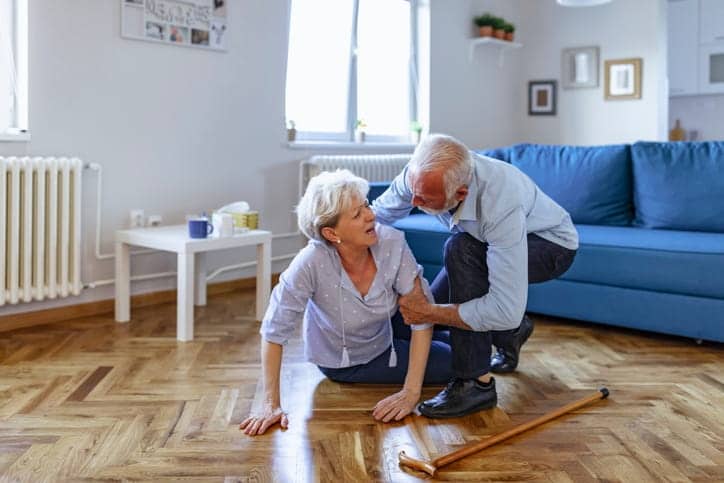According to the Centers for Disease Control and Prevention (CDC), in the U.S., one in four adults 65 or older experience a fall annually. As many as 37% of these falls result in an injury requiring medical attention and/or limiting mobility for at least a full day. In some cases, a fall can even be fatal. Luckily, senior accidents are preventable. Keep reading to learn more about how to prevent senior accidents at home.

How can we prevent home accidents among the elderly?
When it comes to elderly accident prevention, it often depends drastically on the issue the individual is dealing with that makes them more susceptible to an accident. For example, memory issues vs. stability issues tend to lead to different kinds of accidents. The issue may be minor but frustrating, such as a gradual decline in abilities due to something like arthritis.
What is the best way to prevent accidents for elderly people, especially at home?
Elderly accidents at home are, unfortunately, quite common. In most cases, the best way to prevent a senior accident at home is to make everything the individual will need daily easily accessible and to omit obstacles and hazards.
Common hazards to avoid
- Avoid any clutter — walkways should always be clear and easy to walk through
- Cupboards, closets, and other storage areas should be organized and kept tidy so items cannot fall out causing injury
- Make sure all chords are out of the way
- Be cautious of pets — loose animals can be a tripping hazard
- Check all smoke detectors and carbon monoxide detectors regularly
- Regularly check for expired food
- Clean up spills as soon as they happen (especially if it’s oil near the stove)
Solutions to common ailments
- Install handrails in bathrooms (showers, too) and on stairs/ramps (inside and outside)
- Put non-slip mats inside and outside the shower
- Consider a shower chair
- Consider walking aids
- Invest in good lighting
- Avoid overly loose and baggy clothing (tripping hazard)
- Wear proper footwear with a good grip
- Invest in heavy-duty and extra-long oven mitts and an easy-to-use fire extinguisher
- Invest in an Alexa (or equivalent device) and teach yourself and/or your loved one to use it to set timers, set reminders, and to be able to call emergency contact(s) in case of a fall or other emergency
How can you prevent injuries as you get older?
While some factors are unavoidable when it comes to elderly accidents causing injuries, keeping yourself fit and healthy can potentially delay illnesses and weakness that can lead to accidents. This can be better achieved by:
- Get plenty of exercise (including incorporating exercises focusing on balance and strength)
- Regularly having vision checked
- Memory games and crossword puzzles to keep the mind sharp
- Regularly getting medical exams and being honest with your doctor
- Avoiding alcohol
- Being aware of medication side effects
- Avoiding slippery walkways
What are the main causes of accidents among the elderly?
According to the CDC, falls are the most likely cause of injury in this demographic. However, this isn’t the only danger to seniors. Senior accidents also include fire, drowning, and unintentional poisoning.
The U.S. Product Safety Commission (CPSC) reports adults over the age of 65 are 3.5 times more likely to die in a fire than the rest of the population. Chances are higher if the person smokes, but cooking fires also account for some of the 930 annual deaths of seniors caused by fires.
This demographic also experiences roughly 300 deaths a year from drowning (either in a bathtub, spa, or swimming pool) and 45 deaths a year from carbon monoxide poisoning from heat sources and engine-based tools, according to the CPSC. Food poisoning is also more of a concern if memory is an issue, as one may forget if they followed proper food safety precautions.
When is it time to seek assistance?

Anyone can experience a fall or other form of accident, but frequent accidents can indicate a need for extra assistance. The stress levels of the patient and their caregiver(s) are also worth considering. A skilled nursing facility and/or an assisted living facility such as Haven Health can provide a wide range of services that make everyday life for an elderly patient easier and safer.
Signs you or a loved one may require an assisted living facility
- Bruising (from falls the person may or may not admit to)
- Forgetfulness
- Missing doses of medication(s)
- Weight loss
- Poor eating habits
- Social isolation
- Disheveled appearance
- Noticeable issues getting up and around
- Extra moodiness
Elderly accidents can quickly become serious. Especially when not taken seriously and failing to take steps to avoid another elderly accident. If you or a loved one is struggling with accidents, even with common avoidance strategies, be sure to seek professional help through a senior care facility. Whether it’s caring for the elderly after an accident or you have a loved one who just needs a little more assistance, Haven Health has individualized healthcare plans to suit everyone’s needs.
Are you or a loved one concerned it may be time to enter an assisted living facility? Contact Haven Health today to learn more about our assisted living services.
Sources:
Fall Prevention: Balance and Strength Exercises for Older Adults.
Older Adult Falls Data. (2023).
Older Americans Are More Likely to Suffer Fatalities from Falls and Fire; CPSC Report Highlights Hidden Hazards Around the Home. (2022).